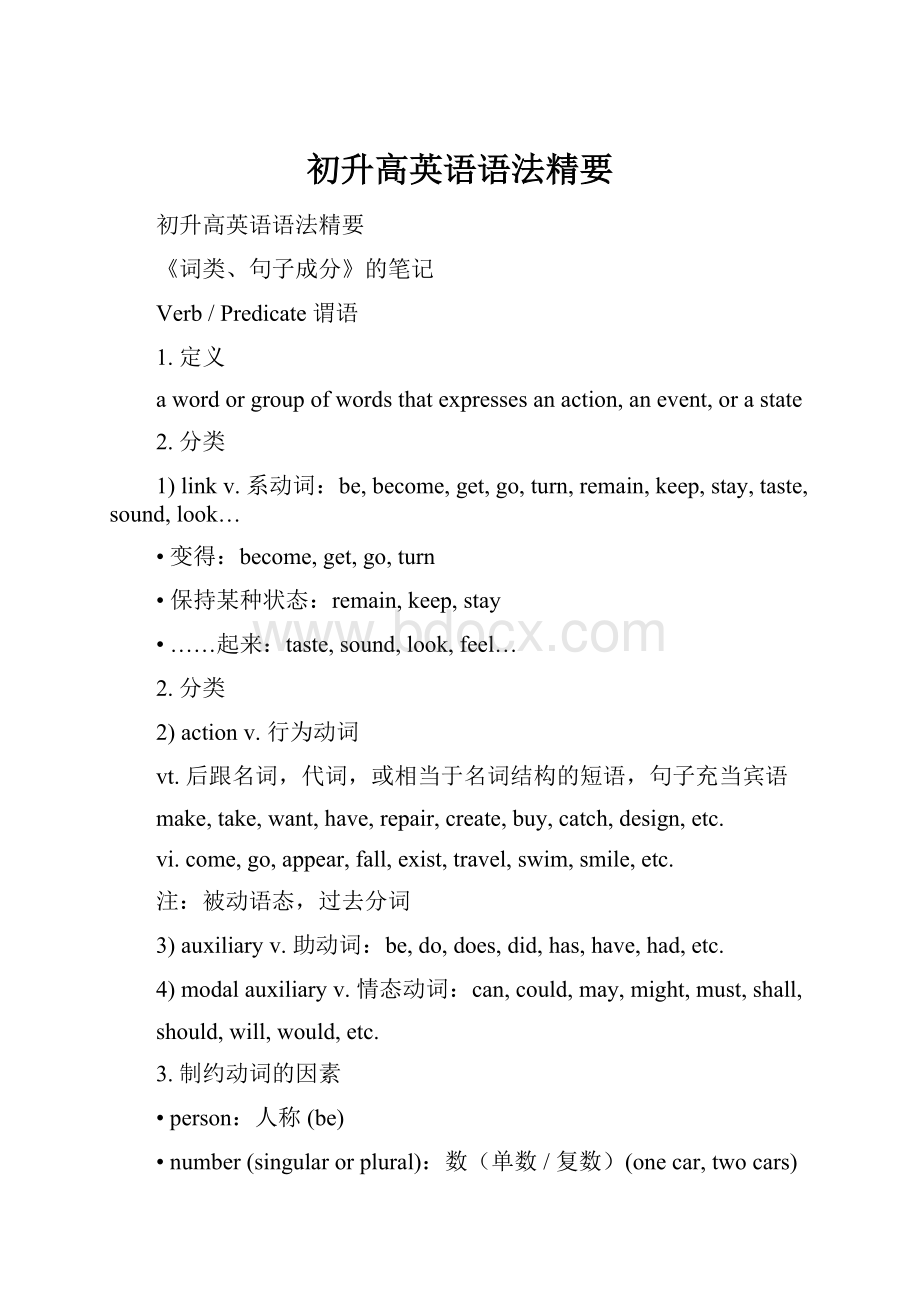初升高英语语法精要.docx
《初升高英语语法精要.docx》由会员分享,可在线阅读,更多相关《初升高英语语法精要.docx(56页珍藏版)》请在冰豆网上搜索。

初升高英语语法精要
初升高英语语法精要
《词类、句子成分》的笔记
Verb/Predicate谓语
1.定义
awordorgroupofwordsthatexpressesanaction,anevent,orastate
2.分类
1)linkv.系动词:
be,become,get,go,turn,remain,keep,stay,taste,sound,look…
•变得:
become,get,go,turn
•保持某种状态:
remain,keep,stay
•……起来:
taste,sound,look,feel…
2.分类
2)actionv.行为动词
vt.后跟名词,代词,或相当于名词结构的短语,句子充当宾语
make,take,want,have,repair,create,buy,catch,design,etc.
vi.come,go,appear,fall,exist,travel,swim,smile,etc.
注:
被动语态,过去分词
3)auxiliaryv.助动词:
be,do,does,did,has,have,had,etc.
4)modalauxiliaryv.情态动词:
can,could,may,might,must,shall,
should,will,would,etc.
3.制约动词的因素
•person:
人称(be)
•number(singularorplural):
数(单数/复数)(onecar,twocars)
•tense:
时态(现在式、过去式、过去分词形式、现在分词形式)
•voice(activeorpassive):
语态(主动/被动)(do,bedone)
•mood:
语气(虚拟/非虚拟)
vt=transitiveverb及物动词
vi=intransitiveverb不及物动词
Object
directobject(Od直接宾语):
apersonorthingthatisaffectedbytheactionoftheverb直接受到动作影响的人或物
indirectobject(Oi间接宾语):
apersonorthingthattheactionisdonetoorfor动作是为人或物做的
•V.+间接宾语+直接宾语
•V.+直接宾语+to/for+间接宾语
nouns/pronouns/todo/doing
ObjectComplement宾语补足语(Co)
1.定义
followsadirectobjectandrenamesitortellswhatthedirectobjecthasbecome对宾语进行补充或说明,与宾语构成主谓关系
2.宾语vs宾补
宾语:
由名词,代词或相当于名词结构的成分充当
宾补:
不一定都由名词充当,能做宾补的成分更多样化
nouns/adjectives/(to)do/doing/done/prep.phrases
注:
宾语和宾补间成主谓关系
Predicative表语
1.定义comesafteraverbsuchasbe,become,get,seem,look 表语通常跟在系动词之后
2.功能showsthesubject'sidentity,characteristicsandstateofbeing说明主语的身份、特征和状态的
3.nouns/adjectives/prep./todo/doing/done
Attributive定语
1.定义
usedbeforeorafteranountodescribeit限定、修饰名词/代词,起修饰、限定的作用
2.adjectives/nouns/prep./todo/doing/done
Adverbial状语
1.oftime时间:
yesterday,3yearsago
2.ofplace地点:
hereandthere,intheschool
3.ofcause原因:
becauseofsth,onaccountofsth
4.ofcondition条件:
if,onconditionthat
5.ofmanner方式:
happily,inakindlyway
6.ofresult结果:
asaresult,consequently
7.ofpurpose目的:
inorderto,soasto
8.ofconcession让步:
although,inspiteofsth
9.ofcomparison比较:
as…as,morethan
简单句基本结构
1.SV(vi.)(主语+谓语动词[不及物])
2.SVO(主语+谓语动词[及物]+宾语)
3.SVOiOd(主语+谓语动词[及物]+间接宾语+直接宾语)
4.SVOCo(主语+谓语[及物]+宾补)
5.SVP(主语+谓语+表语(系表结构))
状语可以出现在以上任何一种结构中
SV+连词+SV
•名词性从句(主语从句、宾语从句、表语从句、同位语从句)
•定语从句:
形容词性质从句
•状语从句:
副词性质从句(时间,地点,原因,条件,方式,结果,目的,让步,比较状语从句)
《名词》的笔记:
I.名词的功能
•Knowledgeispower.(主语)
•Smokingishishabit.(表语)
•Hehasmadegreatprogress.(宾语)
•Whatdoyouthinkofthesuggestion?
(介词宾语)
•Wouldyouliketogotothefashionshowtomorrow?
(定语)
•Thisisournewheadmaster,Mr.Steel.(同位语)
•Weelectedhimourheadmaster.(宾语补足语)
•Hello,John.(呼语)
II.名词的种类和名词的数
1.按语法结构分
•简单名词simplenouns
e.g.boy,girl,child,ice,rain,water,etc.
•复合名词compoundnouns
e.g.armchair,farmland,seaside,classroom,fireman,typewriter
•派生词derivativenouns
e.g.delivery,admiration,greatness,arrangement,etc.
2.按词汇意义分
专有名词propernouns:
指一类事物中某个个体所独有的名称,
如人名、时间、地点、事物、国家、组织的专门名称,首字母须大写
•人:
John,MrsGreen,PresidentObama,Einstein,Mum,Dad,UncleTom,Americans,Jews,etc.
•时间:
May,October,Saturday,Sunday,Christmas,NewYear'sDay
•地点:
Shanghai,Beijing,theYangtzeRiver,Broadway
•事物(报刊杂志名,书名,电影及诗歌的名称):
theNewYork
Times,ChinaDaily,AJourneytotheWest,ForrestGump
•国家、组织:
China,theUnitedStatesofAmerica,NATO,FBI,VOA
普通名词commonnouns:
泛指某一类人或物或抽象概念所共有的名称,包括个体名词、集体名词、物质名词和抽象名词等。
•个体名词individualnouns:
作为个体而存在的人或东西
person,student,postman,city,dream,etc.
•集体名词collectivenouns:
由个体组成的集体
audience,family,committee,police,cattle,government,crew,team,
clothes,people,furniture,staff,public,jury,youth,etc.
•物质名词materialnouns:
无法分为个体的东西
beer,oil,air,cloth,cotton,metal,paper,ice,water,salad,etc.
•抽象名词abstractnouns:
表示一些抽象概念
beauty,carefulness,music,love,happiness,revolution,courage,fear,existence,energy,fun,growth,etc.
revolution
3.按语法意义分
•可数名词(countablenouns)和不可数名词(uncountablenouns)。
•个体名词和集体名词可以认为是可数名词,而专有名词、物质名词和抽象名词为不可数名词。
4.可数名词的复数形式
▩person,shop,nation,window,student,horse,hand,etc.
一般情况下直接在名词后加s,例:
persons,shops,nations,windows,students,horses,hands
▩bus,class,box,watch,brush,etc.
以-s,-x,-ch,-sh结尾的名词加-es,读作/iz/,例:
buses,classes,boxes,watches,brushes
!
例外:
stomach/k/-stomachs
▩boy,toy,day,study,country,factory,etc.
以元音+y结尾的普通名词或以y结尾的专有名词,直接在词尾+s,读作/z/,例:
boys,toys,days
以辅音+y结尾的名词,把y改成i,再加-es,读作/iz/
▩bamboo,kilo,photo,piano,radio,studio,zoo,volcano,mosquito,etc.
以“元音+o”或以“oo”结尾的名词,外来词,一些缩写词和专有名词,在词尾加s
例:
bamboos,kilos,photos,pianos,radios,studios,zoos,volcano(e)s,mosquito(e)s,etc.
▩hero,Negro,tomato,potato,tornado,torpedo,etc.
以辅音+o结尾的名词后加-es,读作/z/,例:
heroes,Negroes,tomatoes,potatoes,tornadoes,torpedoes
以-f或-fe结尾的名词的复数
▩belief,chief,cliff,proof,roof,etc.
第一种是直接加s,例:
beliefs,chiefs,cliffs,proofs,roofs
▩knife,leaf,life,loaf,self,shelf,thief,wife,wolf,etc.
第二种是把-f或-fe改成v再加-es,读作/vz/,例:
knives,leaves,lives,loaves,selves,shelves,thieves,wives,wolves
▩handkerchief,scarf,etc.
第三种可以直接加s也可以把-f或-fe改成v再加-es,例:
handkerchiefs/handkerchieves,scarfs/scarves
▩mouth,path,month,youth,length,etc.
以-th结尾的名词一般直接在词尾加s,例:
mouths,paths,months,youths,lengths,etc.
5.可数名词的不规则复数形式
▩foot,goose,mouse,ox,man,woman,child,tooth,etc.
改变单数名词中的元音字母,或其他形式。
例:
feet,geese,mice,oxen,men,women,children,teeth
▩Chinese,Japanese,Portuguese,Swiss
表示“某国人”,有三种加法:
第一种单复数同形。
例:
Chinese,Japanese,Portuguese,Swiss
▩German,American,Asian,Australian,Canadian,Italian,European,etc.
表示“某国人”,有三种加法:
第二种是直接在词尾加s。
例:
Germans,Americans,Asians,Australians,Canadians,Italians,Europeansetc.
▩Englishman,Frenchman,Irishman,Dutchman,etc.
表示“某国人”,有三种加法:
第三种以-man结尾的变为-men
例:
Englishmen,Frenchmen,Irishmen,Dutchmen,etc.
▩medium,datum,bacterium,phenomenon,stimulus,etc, 外来词的复数,用其本身的复数形式,
例:
media,data,bacteria,phenomena,stimuli,etc.
6.复合名词的复数形式
▩toothbrush,boyfriend,storekeeper,shoe-maker,etc.
以可数名词结尾的在该可数名词后加s,例:
toothbrushes,boyfriends,storekeepers,shoe-makers,etc.
▩son-in-law,passer-by,looker-on,commander-in-chief,etc.
可数名词+介词结构组成的复合名词,在可数名词上加s
例:
sons-in-law,passers-by,lookers-on,commanders-in-chief,etc.
▩mansinger,womandoctor,etc.
以man或woman构成的复合名词,前后两部分都变复数,例:
mensingers,womendoctors,etc.
▩grown-up,forget-me-not,go-between,etc.
以动词或过去分词+介词或副词构成的复合名词,在词尾加s,例:
grown-ups,forget-me-nots,go-betweens,etc.
7.特殊复数形式的名词
▩单复数同形以单数形式出现
例:
sheep,deer,fish,goldfish,aircraft,spacecraft,Chinese,Japanese,yuan…
▩单复数同形以复数形式出现
例:
means,species,crossroads,series,headquarters,works…
▩可单可复
例:
onemeans,twomeans 只用复数形式出现
例:
arms(军火,武器),belongings,trousers,scissors,stockings,thanks,savings,earnings,clothes…
▩去掉s含义不同
例:
arm(手臂),cloth(布)
复数表示特殊含义
例:
customs(海关),goods(物品),greens(青菜),sands(沙滩),waters(水域),manners(礼貌),
spirits(情绪),times(时代),papers(文件,报纸,论文)
III.名词的所有格
1.表示有生命的名词的所有格
▩MaryBaby,ChildrenDay,etc
一般情况下直接在名词后+’s,例:
Mary'sBaby,Children'sDay,etc.
▩teachersoffice,studentsroom,etc.
以-s,-es结尾的复数名词在右上方加',例:
teachers'office,students'room
▩anhourandahalfride,mysister-in-lawhouse,etc.
复合名词或名词词组,在复合名词词尾+'s,例:
anhourandahalf'sride,mysister-in-law'shouse,etc.
两人共有,只在后一个名词上加s,如果不是共有,两个名词后都加s
例:
MikeandMary'sbaby,Mike'sandMary'sbabies,JohnandTom'sroom,John'sandJane'sbooks
2.表示无生命的名词的所有格
通常用of+名词结构来表示所属关系,例:
thegateoftheschool,thewindowoftheroom
有些表示时间、距离、国家、城市、团体、机构等无生命东西的名词也可以加's来构成所有格
例:
today'snewspaper,tenminutes'walk,tendollars'worthofgoods,theworld'ssurface,Fudan'sDepartmentofPhysics
3.名词作定语修饰名词
有些名词没有相同意义的形容词形式,起修饰作用时也不表示所有关系,此类作定语的第一个名词大部分对第二个名词进行分类,或是对第二个名词的属性、来源等加以说明
例:
flowergarden,kitchentable,legmuscle,goldwatch,sportscar,roomnumber,coffeecup
4.双重所有格
在表示所属物的名词前有冠词、数词、不定代词或指示代词时,常用“of+名词's”的形式来表示所有关系。
例:
afriendofmyfather's(friends)=oneofmyfather'sfriends
•介词后的名词应是确定的、特指的,一般指人
afriendofthedoctor's对
afriendofadoctor's错
apageofthebook's错
•双重属格修饰的名词前可带a,any,some,two,this等限定词,但通常不带定冠词
thatfriendofDavid's对
thisgoodideaofJohn's对
thefriendofthedoctor's错
5.所有格所修饰词的省略
一般所有格后的修饰词不能省略,表示教堂、学校、商店、住所或其他公共场所
例:
thedentist's,thechemist's,myaunt's
名词中心词已在上文中出现
例:
MyroomisbiggerthanTom's(room).
IV.派生的名词
1.derivedfromadjective形容词派生出来的名词
▩-ness
e.g.careful,ill,clever,happy,eager,polite,etc.
▩-th
e.g.warm(warmth),deep(depth),strong(strength),wide(width),young(youth),long(length),true(truth),etc.
▩-ty
e.g.able(ability),cruel(cruelty),difficult(difficulty),necessary(necessity),social(society),real(reality),etc.
▩-nce
e.g.absent(absence),different(difference),silent(silence),important(importance),evident(evidence),etc.
▩-dom
e.g.free(freedom),wise(wisdom),etc.
▩othervariations
e.g.high(height),brave(bravery),etc.
2.derivedfromverb动词派生出来的名词
▩-tion
e.g.act,add,invent,explain(explanation),imagine(imagination),reduce(reduction)
▩-sion:
常出现在以d,de,t结尾的词后
e.g.admit(admission),decide(decision),divide(division),permit(permission),discuss(discussion)
▩-ment:
动词变名词时,一般不省略e
e.g.improve,treat,punish,employ,argue(argument)
▩-ce:
ance,ence
e.g.accept(acceptance),assist(assistance),prefer(preference),occur(occurrence)
▩-ing
e.g.begin,feel,read,write
▩-er,-or,-ar
e.g.invent(inventor),begin(beginner),write(writer),work(worker),teach(teacher),think(thinker思想者),beg(beggar)
▩others
e.g.compare(comparison),arrive(arrival),complain(complaint),discover(discovery